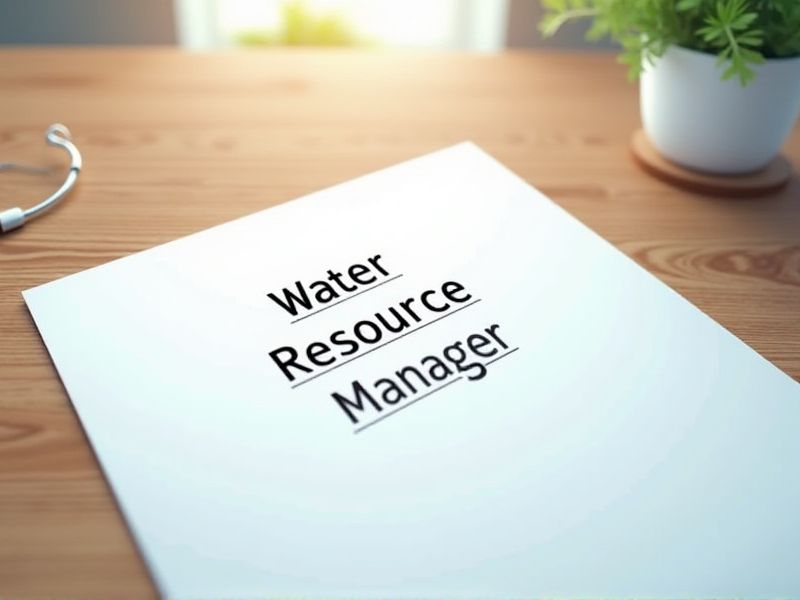
Water Resource Managers play a crucial role in ensuring the sustainable management of water supplies, requiring specialized knowledge and skills. Certifications help validate their expertise in environmental policies, water treatment processes, and resource conservation techniques. Employers often favor professionals with recognized credentials as it assures them of the ability to address complex water-related issues effectively. Consider these important certifications you may need as a Water Resource Manager.
Professional Engineer (PE) License
A Professional Engineer (PE) license establishes credibility and demonstrates the verified competence required for designing and managing water resources projects. Regulatory bodies often mandate a PE license to ensure compliance with safety and environmental standards. Holding a PE license grants the authority to sign and seal official documents, which is crucial for legally binding engineering work. As a result, career prospects and opportunities for advancement within water resource management significantly improve with a PE license.
Certified Floodplain Manager (CFM)
Certified Floodplain Managers possess specialized knowledge essential for effective floodplain management, directly reducing flood risks. Their expertise ensures compliance with local and federal regulations, preventing legal issues for communities. Accurate risk assessment and floodplain mapping by CFMs enables effective water resource planning and development. Engaging CFMs enhances resilience against flooding, protecting infrastructure and natural habitats.
Certified Water and Wastewater Operator (CWWO)
Certified Water and Wastewater Operators (CWWO) ensure that water treatment processes meet regulatory standards, which is crucial for public health and safety. Without properly trained operators, water resource managers may face legal and ethical challenges due to non-compliance with regulations. CWWOs possess the technical expertise necessary to efficiently operate and maintain treatment facilities, optimizing resource management. Their role is vital in detecting and resolving issues that could lead to environmental damage or resource wastage.
Certified Environmental Professional (CEP)
The Certified Environmental Professional (CEP) credential ensures that a Water Resource Manager possesses a comprehensive understanding of environmental science and regulations. This knowledge is crucial for effective management and protection of water resources, as well as for navigating complex environmental policies and legal frameworks. Having CEP certification indicates a commitment to maintaining high standards of environmental stewardship, which builds trust with stakeholders and the community. The credential also equips professionals with skills to assess environmental impacts and develop sustainable water usage strategies, addressing both present needs and future challenges.
LEED Accredited Professional (LEED AP)
A Water Resource Manager benefits from being a LEED Accredited Professional as this knowledge ensures designs and projects incorporate sustainable water management practices, aligning with LEED standards. LEED AP credential equips Water Resource Managers with skills necessary for reducing water consumption in buildings, a major component of environmental sustainability. Their expertise aids in maximizing water efficiency, which can significantly lower operational costs and reduce environmental footprint. This accreditation also enhances credibility and competitive advantage in sectors increasingly prioritizing green practices and sustainable solutions.
Project Management Professional (PMP)
Achieving a Project Management Professional (PMP) certification helps a Water Resource Manager effectively plan and execute complex projects involving water management. PMP equips managers with skills in risk assessment, which is critical when dealing with unforeseen environmental variables. Adopting PMP methodologies improves resource allocation, ensuring efficient use of budget and personnel in water resource projects. Enhanced stakeholder communication, a core component of PMP, facilitates better collaboration with government agencies and community groups.
Geographic Information Systems Professional (GISP)
A Geographic Information Systems Professional (GISP) is vital for a Water Resource Manager because they specialize in analyzing spatial data, enabling more precise water resource planning. GISPs facilitate the visualization of complex hydrological patterns, helping managers identify potential flood zones or water scarcity areas. Their expertise in mapping and data integration allows for efficient resource allocation, minimizing the risk of wastage and ensuring sustainable management. Handling real-time data, GISPs contribute to more responsive and adaptive strategies in managing water resources effectively.
Certified Professional in Erosion and Sediment Control (CPESC)
Certified Professional in Erosion and Sediment Control (CPESC) expertise is crucial, as it ensures compliance with environmental regulations governing water bodies. Possessing this certification indicates a professional's ability to assess and mitigate erosion risks, preventing soil degradation and sedimentation in water systems. Water Resource Managers rely on CPESC skills to design and implement effective erosion control measures, which help maintain water quality and ecosystem health. This specialized knowledge directly affects the sustainability of water resources, aligning project outcomes with ecological and regulatory standards.
Certified Water Efficiency Professional (CWEP)
Water Resource Managers face increasing pressure to optimize water usage due to growing scarcity and demand, making the expertise of a Certified Water Efficiency Professional (CWEP) crucial. CWEPs possess specialized knowledge in water conservation techniques and technology, which enhances resource management strategies. Their certification ensures adherence to industry standards and regulations, thereby minimizing legal and environmental risks. By integrating CWEPs into their teams, Water Resource Managers can improve efficiency and sustainability in water distribution and usage practices.
Certified Water Management Professional (CWMP)
The Certified Water Management Professional (CWMP) designation provides Water Resource Managers with validated expertise, ensuring effective oversight of water conservation projects. Proper certification enables managers to develop and implement strategies that optimize water use, directly reducing waste and conserving resources. Certified professionals contribute to the sustainable management of water systems, aligning with regulatory requirements and enhancing system efficiency. Possessing the CWMP credential, managers are more adept at navigating complex environmental challenges, leading to informed decision-making and better resource allocation.
Summary
By obtaining certifications, you enhance your credibility and expertise in managing water resources effectively. This recognition often leads to increased trust from stakeholders and can result in more project opportunities. Certified skills typically enable more sustainable and efficient use of resources, potentially reducing costs and improving environmental outcomes. Access to a broader professional network and knowledge base is likely, facilitating better decision-making and innovative solutions.
